Chapter 6
Building a fair and social Europe

Over the past several years, in the face of global challenges such as the COVID-19 pandemic, the cost-of-living crisis, climate change and the digital transition, the European Union has redoubled its efforts to protect and empower people and communities. In 2024, its work to improve living and working conditions for everyone continued apace. As the successful European Year of Skills wrapped up, the European Commission presented a new action plan to tackle labour and skills shortages, thereby supporting the EU’s sustainable and inclusive growth and ensuring its competitiveness. The EU continued to support new measures so workers can enjoy their social rights. For example, new rules are starting to ensure that workers are protected by adequate minimum wages, while new rights and protections will improve conditions for workers in the gig economy. In addition, the EU approved a groundbreaking law to combat violence against women and introduced new cards that will make travelling easier for persons with disabilities.
The EU has set an ambitious course towards a fair and inclusive Europe that protects its citizens and creates opportunities. Its policies aim to improve living and working conditions for everyone in the EU by promoting more and better jobs, skills, equality, and social protection and inclusion.
The 20 principles of the European Pillar of Social Rights - open a new tab. – and the European Pillar of Social Rights Action Plan - open a new tab. that will turn these principles into concrete measures – guide EU and national policy in these key areas. At an April high-level conference - open a new tab. in La Hulpe, Belgium, the EU, its social partners and civil-society organisations renewed their commitment to a stronger social Europe by signing a declaration reaffirming the pillar as the guiding framework for EU social policies. The La Hulpe Declaration on the Future of the European Pillar of Social Rights also welcomes the upcoming review of the related action plan in 2025. This review will also serve as a basis for further action to achieve the 2030 EU and national headline targets for employment, skills, and poverty reduction.
Progress at the EU and national levels towards the targets is monitored in detail in the annual Joint Employment Report. The latest report - open a new tab. shows that the EU is well on track towards its employment target following a job-rich recovery. However, significant headway still needs to be made to reach the target on poverty reduction, progress towards which has improved slightly even in the face of the various crises over the last several years, and notably despite high inflation. Further progress is also needed on adult learning, with the effects of the EU’s policy efforts in this area yet to be felt in most Member States.
Three EU-wide targets
- At least 78 % of the population aged 20 to 64 should be in employment by 2030.
- At least 60 % of all adults should participate in training every year by 2030.
- The number of people at risk of poverty or social exclusion should decrease by at least 15 million by 2030.
Homelessness is one of the most extreme forms of social exclusion, and affects all Member States. In February, an informal ministerial conference - open a new tab. brought representatives from Member States and the European Parliament together with experts and associations actively combating homelessness. Delegates expressed their support for the European Platform on Combatting Homelessness - open a new tab., welcoming the work done so far. They stressed the need to increase the effort, political commitment and resources put into tackling homelessness, with the aim of achieving the Lisbon Declaration objective of working towards ending homelessness by 2030. The conclusions of the conference were reflected in the La Hulpe Declaration.
Multiple projects complementing the work of the European Platform on Combatting Homelessness and supported by the EU were launched in 2024, including the European Homelessness Count - open a new tab., the OECD Toolkit to Combat Homelessness - open a new tab. and four pilot projects tackling homelessness.


Transitioning to a longevity society
With Europeans living longer and healthier lives, EU and national policies need to be forward-looking to empower people of all ages and ensure the welfare of future generations. This means designing policies that encourage active and healthy ageing and have a positive impact on how Europeans grow old. Building on the findings of the 2024 Ageing Report - open a new tab. and the 2024 Pension Adequacy Report - open a new tab., experts and stakeholders came together to reflect on key challenges of longevity in Europe. Participants noted that further reforms would be needed to ensure adequate and sustainable old-age protection and to tackle socioeconomic and gender inequalities in old age. Investing in active and healthy ageing, prolonging working lives and supporting adapted and flexible work arrangements will be part of the solution, alongside effective and efficient pension and long-term care systems.
Addressing labour and skills shortages
Labour and skills shortages have been rising in all Member States for almost a decade. This is largely due to demographic change and the increasing demand for skills as part of the green and digital transitions, and also to poor working conditions in certain occupations and sectors. The Commission has identified more than 40 occupations across different sectors that are experiencing EU-wide shortages - open a new tab., with some differences across the Member States. Addressing these shortages is key to increasing the EU’s capacity for innovation, unlocking its growth potential, boosting its competitiveness, fostering quality job creation and increasing economic and social resilience.
- By 2030, 3.5 million new jobs are expected to be created in renewable energy sectors.
- Nearly two thirds (63 %) of small and medium-sized enterprises cannot find the talent they need.
- Forty-two occupations are experiencing EU-wide shortages.
To tackle this challenge, in March the Commission presented an action plan - open a new tab., prepared in close cooperation with its social partners, who, being closest to the labour market, play a crucial role in helping to implement solutions to address these challenges. The plan provides a comprehensive framework to address shortages along five main policy areas at the EU, national and social-partner levels.
Action Plan on Labour and Skills Shortages in the EU
- Supporting under-represented groups in becoming more active in the labour market.
- Providing support for skills development, training and education.
- Improving working conditions.
- Improving fair mobility for workers and learners across the EU.
- Attracting talent from outside the EU.
Implementing the action plan will be crucial for achieving the EU’s headline targets on employment and skills by 2030. The plan builds on the many policy and funding measures already in place at the EU level, such as the Pact for Skills - open a new tab.. Skills partnerships have committed to offer reskilling and upskilling opportunities for more than 25 million people of working age across the EU by 2030. In addition, since its launch in 2020, Pact for Skills members have together invested over €150 million in upskilling and reskilling activities. Moreover, the EU is investing around €65 billion in skills programmes, notably via the Recovery and Resilience Facility - open a new tab. (see Chapter 3) and the European Social Fund Plus - open a new tab..
The European Year of Skills, which ran from 9 May 2023 to 8 May 2024, provided fresh impetus to lifelong learning by putting skills centre stage and helping match people’s aspirations and skill sets with opportunities in the job market. Local communication efforts reached millions of people, contributing to a significant increase in awareness of EU skills policies.

The European Year of Skills in numbers
2 000+
events across
Europe
1.37million visitors to 54 events in 23 Member States
69million people reached on social media
190
EU-led initiatives
on skills
90million
video views on
YouTube and Twitch
41million television viewers in five targeted countries
The European Year of Skills – changing minds
More aware of EU skills policies
26 % February 2023
53 % December 2023
More willing to take a training course
19 % have not seen Year of Skills initiatives
64 % have seen Year of Skills initiatives
Say that the year has had an impact on their lives
35 % have not seen Year of Skills initiatives
72 % have seen Year of Skills initiatives
Source: European Union, ‘Results of the European Year of Skills - open a new tab.’, 2024.
The New European Bauhaus Academy - open a new tab., which aims to boost sustainability skills in the construction sector, was launched in April. The academy will combine the values of sustainability, aesthetics and inclusiveness and support the implementation of the European Green Deal - open a new tab.. Over the next two years, it will bring together educational and training professionals and connect five local and regional hubs across Europe.
Support for Member States
The EU’s Technical Support Instrument - open a new tab. is assisting 12 Member States with their skills reforms. The support provided ranges from help designing a competence-based curriculum and the development of micro-credentials (which certify the outcomes of short-term learning experiences) to integrating refugee children into the education system.
Project example
The instrument supported a two-year project in Belgium to assist schools in the effective use of ICT for learning and teaching. The goal was to enable schools to develop team-based approaches to ICT coordination and digital education.
Supporting workers
New rules - open a new tab. that aim to ensure that national minimum wages guarantee a decent living for workers were to be incorporated into national law by 15 November. The majority of the Member States have notified the Commission that they have done so. The implementation of the directive on adequate minimum wages will contribute to better living and working conditions by improving the adequacy of statutory minimum wages and promoting collective bargaining on wages. It will also enhance the access of workers to minimum-wage protection through better enforcement, information and redress mechanisms. The directive has already started to produce positive effects, prompting debates at the national level on the adequacy of minimum wages. As a result, over the past two years, statutory minimum wages have increased significantly in most Member States, helping to compensate for the impact of high inflation on the purchasing power of low-wage earners.
In July 2024, the minimum wage in the EU Member States ranged from €477 per month in Bulgaria to €2 571 per month in Luxembourg.
The EU established new rules - open a new tab. in 2024 to improve the working conditions of 28 million platform workers in the EU. The Platform Work Directive will ensure that the employment status of people working through digital labour platforms is correctly classified. Once reclassified, platform workers will be able to enjoy the labour rights and social benefits they are entitled to. The new rules also promote greater transparency and accountability with respect to automated systems that support or replace managerial functions at work, including the right to contest algorithm-driven decisions. Member States have two years to incorporate the rules into their national legislation.
In addition, efforts to strengthen bodies that represent European workers in multinational companies advanced in 2024. A new proposal - open a new tab. to revise the current rules seeks to strengthen the role of European Works Councils - open a new tab., which consult workers and keep them informed about decisions that could affect their employment or working conditions. The aim is to make these bodies easier to set up, improve their gender balance and ensure workers are consulted before decisions are made.
Telework has become widespread, particularly since the COVID-19 pandemic. According to the EU Labour Force Survey - open a new tab., the overall proportion of employees working from home in the EU has more than doubled in the last few years, from 11.1 % in 2019 to 22.4 % in 2023. At the same time, more attention has been given to the impact of an ‘always on’ culture on workers’ mental health. In March, a two-stage consultation was launched - open a new tab. with social partners on fair telework and the right to disconnect.
It is estimated that there are around 3.1 million trainees in the EU. Quality traineeships can help young people gain practical work experience and learn new skills, while enabling employers to attract, train and retain staff. In March, the Commission put forward an initiative to improve working conditions for trainees in the EU, including pay, inclusiveness and the quality of traineeships. As well as revising the existing Quality Framework for Traineeships - open a new tab. to address issues such as fair pay and access to social protection, it also proposes legislative action to improve working conditions for trainees and combat employment disguised as traineeships.
To support the labour market further, the EU introduced new funding - open a new tab. worth €23 million through the European Social Fund Plus for innovative projects aimed at reducing long-term unemployment and helping people find work. The European Globalisation Adjustment Fund for Displaced Workers - open a new tab. also provided support to nearly 1 600 workers laid off in Belgium, Denmark and Germany.
Strengthening social dialogue
Social partners – organisations representing the interests of EU workers and employers – play an important role in improving working conditions and productivity, strengthening the competitiveness of EU businesses and boosting the EU’s prosperity and resilience. This is especially relevant in view of the changes brought about by new technologies and the need for a fair transition to climate neutrality. At a January meeting in Val Duchesse, Brussels, Belgium, the EU and its social partners agreed to renew - open a new tab. their commitment to strengthen social dialogue at the EU level and to join forces in addressing key challenges in the EU’s economies and labour markets. The social partners also discussed labour market challenges at the Tripartite Social Summit - open a new tab. in March.
88 % of people in the EU consider a social Europe important to them personally.
60 % are aware of at least one recent key EU initiative strengthening a social Europe.
49 % Minimum Wage Directive
38 % Work–Life Balance Directive
37 % European Social Fund Plus
33 % Child Guarantee
30 % Platform Work Directive
29 % Skills Agenda
Source: European Commission, Special Eurobarometer 546 - open a new tab., April 2024.

The European Education Area
The European Education Area - open a new tab. is the EU’s main policy strategy for education to help Member States work together to build more inclusive and resilient education and training systems. It aims to remove barriers to learning and improve access to quality and inclusive education, training and lifelong learning for all. As part of this vision, the EU launched an initiative to establish alliances between higher education institutions from across Europe.

Over the last five years, the European Universities initiative - open a new tab., funded by Erasmus+ - open a new tab., has gone from strength to strength. With the addition of 14 new alliances - open a new tab., joining the 50 previously selected, this initiative has achieved the goal - open a new tab. of having at least 60 European Universities alliances, with more than 500 universities being involved by mid 2024. By working together and pooling resources, higher education institutions can offer innovative programmes and the cutting-edge skills needed for the green and digital transitions across the EU. Universities will be able to offer attractive and competitive joint degree programmes and attract and retain talent from around the world.
Following the push for more joint programmes by the higher education sector, including by many European Universities alliances, the Commission has proposed a concrete path for cooperation - open a new tab. between Member States and the sector towards the creation of a European degree. The blueprint - open a new tab. for a new type of programme, delivered at the national, regional or institutional level, builds on six projects involving more than 140 higher education institutions from across the EU. This vision of how to make the European degree a reality was presented alongside two proposals for Council recommendations to support the higher education sector. The first - open a new tab. aims to improve quality assurance processes and the automatic recognition of qualifications in higher education, while the second - open a new tab. seeks to make academic careers more attractive and sustainable.
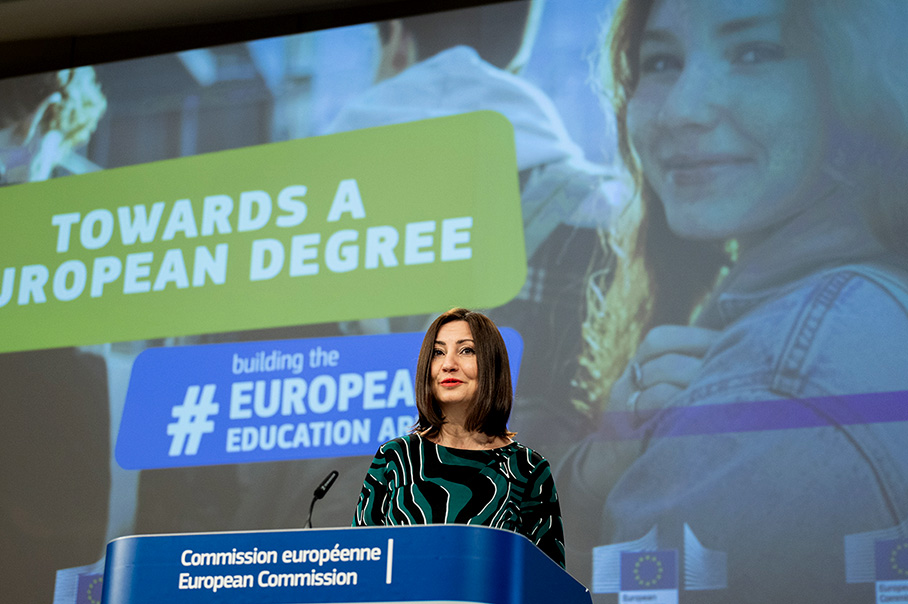
Learning mobility
A period spent studying, training or working abroad brings many benefits, such as boosting communication and intercultural skills. To improve learning opportunities abroad for everyone, new EU-level targets - open a new tab. have been set.
New targets on learning mobility
- At least 23 % of graduates in higher education should have a learning experience abroad by 2030.
- At least 12 % of learners in vocational education and training should benefit from a learning experience abroad by 2030.
- At least 20 % of all learners benefiting from learning mobility abroad by 2027 should be people with fewer opportunities.
Spending time in another Member State also provides an opportunity to improve existing language skills or learn a new language. Linguistic diversity is promoted through projects funded by the Erasmus+ and Creative Europe - open a new tab. programmes. A 2024 survey revealed that, overall, people in Europe have a positive attitude towards multilingualism and language learning.
Europeans and their languages
86 % of people in the EU think that everyone living in the EU should be able to speak at least one other language.
76 % think that improving language skills should be a policy priority.
84 % believe that regional and minority languages should be protected.
3 out of 5 can have a conversation in at least one other language (rising to 4 out of 5 among young people).
Source: European Commission, Special Eurobarometer 540 - open a new tab., May 2024.
The EU also engages with governments to make higher education in Europe more inclusive and accessible through the Bologna Process - open a new tab., which brings together countries belonging to the European Higher Education Area and the Commission. In May, 47 representatives of higher education ministries and the EU reaffirmed their commitment to supporting student and staff mobility. In the Tirana Communiqué - open a new tab., they took stock of higher education cooperation and set the direction for 2025–2027. They also agreed updated commitments relating to removing barriers to learning mobility, the internationalisation of higher education and high-quality education, ensuring strong links to EU flagship initiatives such as the European Universities initiative and the blueprint for a European degree.
Erasmus+
The EU programme for education, training, youth and sport.
- 37 years of Erasmus+ - open a new tab..
- Over 16 million participants in learning mobility projects.
- More than 900 000 organisations have participated since 2014.
- 2024 budget: €4.65 billion.

2024 marked the 20th anniversary of Erasmus Mundus - open a new tab., the European higher education cooperation initiative funded by the Erasmus+ programme that supports the setting up of international joint master’s degrees. Since its launch, almost 50 000 students from 179 countries have taken part in Erasmus Mundus master’s programmes. More than 34 000 students have received a scholarship from the EU. The programme’s achievements and its contributions to the development of the international dimension of Erasmus+ were celebrated at a conference - open a new tab. in May.
Supporting research and innovation
2024 marked 40 years - open a new tab. since the launch of the EU’s first funding programme dedicated to research and innovation. Since 1984, the EU has invested over €280 billion in science, research and innovation, providing more than 120 000 grants to around 75 000 beneficiaries. This funding has created quality jobs, supported innovative companies and enhanced the EU’s competitiveness and technological leadership. Over the last four decades, the EU has increased its investment in the field of research and innovation and expanded its focus to tackle global challenges, harness the potential of technology and meet the changing needs of society. The fruits of these labours have also been recognised by the awarding of more than 30 Nobel Prizes to EU-funded researchers.
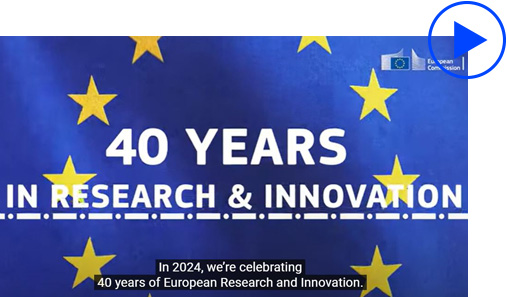
‘Support from the EU’s research framework programmes has been very important to me throughout my career, from the beginnings in Sweden onwards, allowing me to build a research group, purchase the necessary laboratory equipment and explore innovative ideas.’
Professor Anne L’Huillier, 2023 Nobel Prize Winner in Physics.

David Baker, who received funding under the EU’s Marie Skłodowska-Curie Actions - open a new tab. programme, was awarded the 2024 Nobel Prize in Chemistry ‘for computational protein design’, alongside Demis Hassabis and John M. Jumper ‘for protein structure prediction’. He joins the illustrious list of 18 fellows, scientists and supervisors from the programme who have received a Nobel Prize since 2010.
Horizon 2020
The final evaluation report - open a new tab. on Horizon 2020, the EU research and innovation framework programme that ran from 2014 to 2020 - open a new tab., shows that investing in research and innovation pays off greatly. The report found that Horizon 2020 made a major contribution to building an EU society and economy rooted in knowledge and innovation, and benefited people in Europe far beyond what could have been achieved at a national or regional level. The programme financed concrete solutions – from novel hydrogen-fuelled transport and mRNA vaccines to micro- and nanoelectronics – and made a decisive contribution to climate science. Each euro in costs linked to the programme will ultimately bring five euro in benefits to EU citizens by 2040, proving the high level of value for money that investment in research and innovation for European society represents.
Horizon 2020 in figures
- Budget€80 billion
- Projects funded35 000
Contributing to a 20 % increase in job growth across the EU.
Horizon Europe
A new feature of the current research and innovation framework programme for 2021–2027, Horizon Europe - open a new tab., is the introduction of strategic plans, developed by the Commission together with the Member States, associated countries and the Parliament with input from stakeholders and citizens. The second Horizon Europe Strategic Plan - open a new tab., published in March, sets the focus for the final three years of the programme (2025–2027). This will steer research and innovation funding within and beyond Europe to tackle key global challenges such as climate change, pollution and loss of biodiversity, the digital transition and an ageing population. With this new strategic plan, the EU is raising the programme’s ambition on biodiversity by making a commitment to dedicate 10 % of Horizon Europe’s total budget for 2025–2027 to biodiversity-related topics. This complements existing targets for climate expenditure (35 % over the lifetime of Horizon Europe) and the main digital activities (€13 billion over the same period).
The strategic plan also introduces the New European Bauhaus Facility - open a new tab., a new funding tool to revitalise neighbourhoods in the EU and beyond. From 2025 to 2027, €120 million per year will be made available for New European Bauhaus projects on research and innovation through Horizon Europe, with a similar level of funding expected to come from other EU programmes to support the roll-out. The pioneering New European Bauhaus initiative brings citizens, public authorities, experts, businesses, universities and institutions together to reimagine and jointly promote sustainable and inclusive living.
Under Horizon Europe, the European Research Council - open a new tab. helps to push the boundaries of knowledge across all fields of science and scholarship through its prestigious grant schemes. Grants worth a total of €2.3 billion were awarded in 2024 to projects selected based on their scientific excellence.
€1.25 billion in funding was announced during the year to support research under the Marie Skłodowska-Curie Actions, the EU’s flagship programme for doctoral and postdoctoral training. The funding will support and provide jobs to about 10 000 talented researchers from all over the world at all stages of their career.
To improve conditions for career development and attract and retain researchers in Europe, the European Research Area Talent Platform - open a new tab. was launched in June. It will act as a central hub offering researchers easy access to career development, funding and international collaboration tools, boosting their mobility and career progression across Europe.
Equality and non-discrimination are core values and fundamental rights in the EU. To ensure an open and inclusive society, the EU has put in place a range of dedicated strategies, with concrete measures and funding available to make a difference to people’s lives across the EU.
EU-wide disability and parking cards
New rules creating the European Disability Card and the European Parking Card for Persons with Disabilities were approved - open a new tab. in October. The cards will apply to EU citizens and family members with recognised disabilities, and to non-EU citizens with recognised disabilities living in the EU.
When travelling in other Member States, the European Disability Card will provide equal access to special conditions and preferential treatment offered by a wide range of services. These could include, for example, priority or free access, personal assistance in venues, braille or audio guides, and free or reduced fares. European Parking Card holders will be able to access parking conditions and facilities for persons with disabilities in other Member States. The new rules will apply for short stays of up to three months, or for longer periods in some cases, for example for cardholders participating in EU mobility programmes (such as Erasmus+ and European Solidarity Corps - open a new tab. projects). Member States may also apply the directive for longer periods for other cardholders.
The European Disability Card will complement national disability cards or certificates, and the new parking card will replace the current EU parking card for persons with disabilities. Both cards are expected to be operational across the EU in 2028.
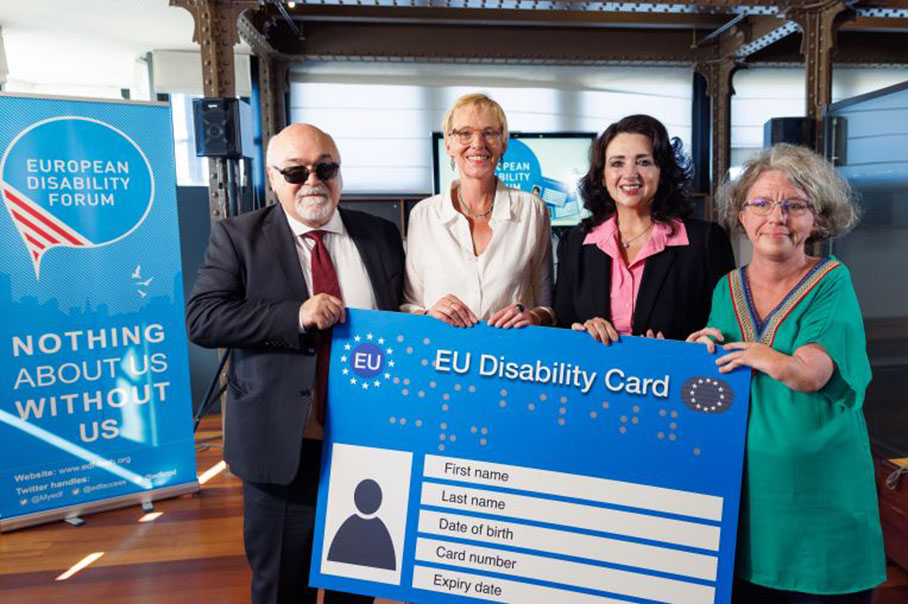
Making our cities more accessible
Accessible spaces are a crucial first step towards achieving equality. 2024 marked the 15th anniversary of the Access City Award - open a new tab., a prestigious prize that recognises the outstanding efforts EU cities are making to prioritise accessibility for persons with disabilities.
In November, Vienna, Austria, won the 2025 Access City Award - open a new tab. for being a standout example of how big capital cities can successfully integrate accessibility into every aspect of urban life. To celebrate the 2024 Olympic and Paralympic Games, Nuremberg, Germany, was awarded a special mention for accessible sports infrastructure for investing in inclusive sport centres with adapted equipment and training for coaches in adaptive sports and inclusive swimming.

To mark the 15th anniversary of the Access City Award, representatives from past winning cities, organisations representing persons with disabilities and stakeholder associations met to exchange best practices. They also gathered feedback for the second phase of the 2021–2030 European Strategy for the Rights of Persons with Disabilities - open a new tab..
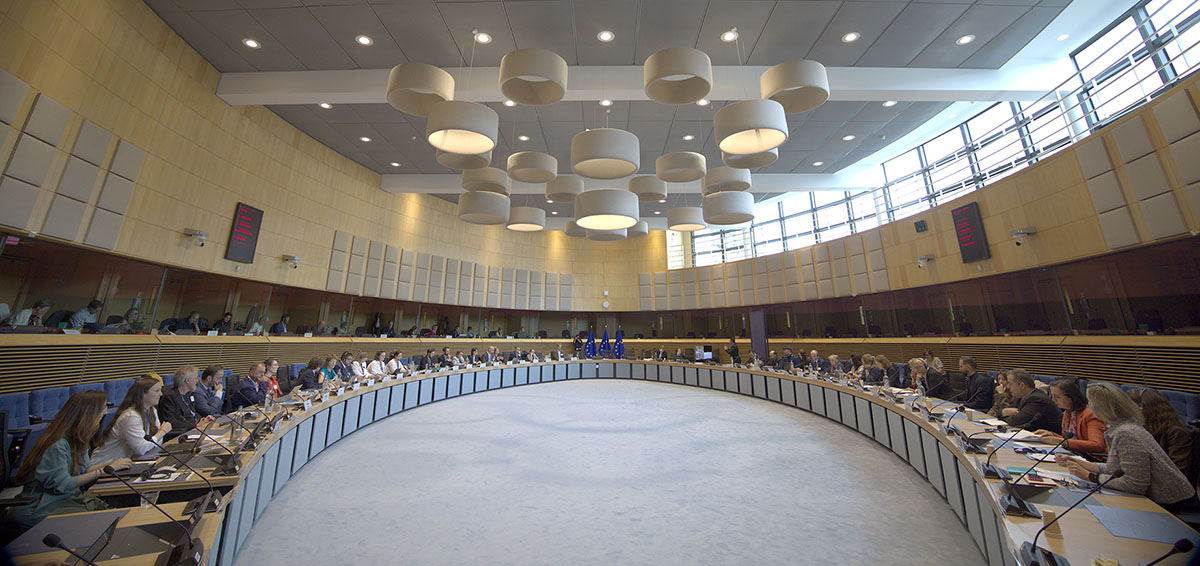
Gender equality
The EU has made significant advances in promoting gender equality over recent years. Milestones include new rules on pay transparency - open a new tab. to strengthen the application of the principle of equal pay for equal work, new rights to improve work–life balance - open a new tab. and targets to improve gender balance on corporate boards - open a new tab..
However, despite substantial progress, there is still a long way to go to achieve gender equality. According to the 2024 Report on Gender Equality in the EU - PDF file, open a new tab., significant gender gaps still exist in the labour market and in decision-making positions, including political representation, while gender stereotypes of women’s role in society remain a challenge. In addition, women and girls remain particularly vulnerable to the consequences of war and conflict. The report also notes increased obstacles to freedom of expression, especially online, and a growing backlash against women’s rights in various parts of the world.
In 2024, a groundbreaking EU law - open a new tab. combating violence against women and domestic violence was adopted. The new law makes certain forms of violence against women into specific criminal offences, notably female genital mutilation, forced marriage and the most widespread forms of cyberviolence (e.g. the non-consensual sharing of intimate or manipulated material, cyberstalking and cyber harassment), along with gender-based cyber incitement to violence or hatred.



Sources: Eurostat - open a new tab.; European Institute for Gender Equality - open a new tab.; European Union Agency for Fundamental Rights - open a new tab..
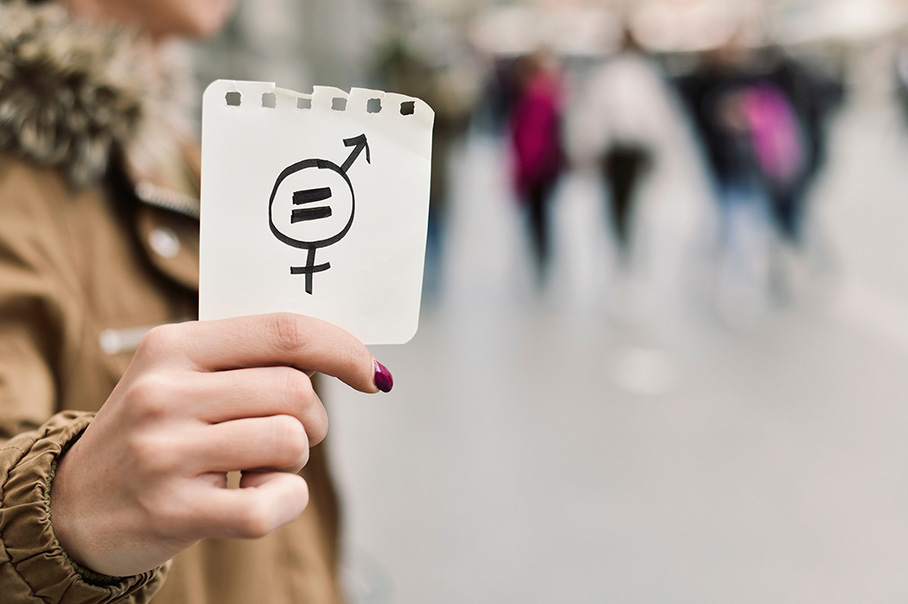
The directive strengthens victims’ access to justice, protection and support, and requires Member States to put in place comprehensive measures of prevention and to promote the central role of consent in relationships. Member States have until 14 June 2027 to incorporate the new rules into their national law.
Violence against children also remains a significant challenge both inside and outside the EU. In April, the Commission issued recommendations - open a new tab. to support Member States in strengthening their child-protection systems. The recommendations echo the views of more than 1 000 children, collected through the EU Children’s Participation Platform - open a new tab..
Promoting gender equality in public policy and budgetary processes
To support its commitment to promote gender equality, in 2024 the EU provided tailor-made technical expertise - open a new tab. to 12 administrations in nine Member States (Germany, Ireland, Greece, Spain, France, Italy, Cyprus, Portugal and Romania). The aim is to help them put in place policies and budgets that address and promote gender needs.
Thanks to changes in EU financial rules, gender will now be taken into account in the EU’s financial programmes. The changes include improved monitoring, which will now distinguish information by gender. Additionally, the activities supported by EU funds will, whenever possible – starting with the next budgetary period (post-2027) – have to consider the specific needs and priorities of women and girls.
New standards for equality bodies
National equality bodies - open a new tab. play an important role in making sure that EU law on non-discrimination is implemented on the ground. They promote equal treatment by providing independent assistance to victims of discrimination, conducting independent surveys, publishing independent reports and making recommendations on matters relating to discrimination. However, despite their valuable work, equality bodies currently face a number of challenges and still have untapped potential for preventing and combating discrimination.
New legislation adopted by the EU - open a new tab. in 2024 will give equality bodies greater independence, resources and powers, helping to strengthen the enforcement of EU law on non-discrimination. Member States have until 19 June 2026 to adapt their national legislation.
The new rules will mean
that Member States must ensure
that all equality bodies can:
- provide free and accessible services to all victims on an equal basis;
- engage in prevention, promotion and awareness raising;
- act in court in discrimination cases to provide reliable support to victims.
People in the EU believe that discrimination is widespread in their countries
Discrimination based on:
65 % being Roma
61 % skin colour
60 % ethnic origin
57 % being transgender
54 % sexual orientation
Source: European Commission, Special Eurobarometer 535 - open a new tab., December 2023.
Strengthening LGBTIQ equality in Europe
The results of the third LGBTIQ survey - open a new tab., published in May by the European Union Agency for Fundamental Rights - open a new tab., show that lesbian, gay, bisexual, trans, intersex and queer (LGBTIQ) people are more open about their sexual orientation, gender identity or sex characteristics in their social environment than they were in the past. However, they face more harassment and violence. At the same time, unreported incidents of discrimination, violence and harassment remain high.
A report - PDF file, open a new tab. on the implementation of the LGBTIQ Equality Strategy shows that it has had a positive impact on the situation of LGBTIQ people in the EU. Twelve Member States have LGBTIQ equality strategies or action plans in place, complementing the EU strategy, while others are currently preparing their first dedicated national strategies or action plans. Cooperation with Member States will be strengthened through the exchange of good practices in the development and implementation of national action plans.





Source: European Union Agency for Fundamental Rights, LGBTIQ Equality at a Crossroads – Progress and challenges - open a new tab., 2024.
Combating racism in all its forms
A report on the implementation of the EU’s Antiracism Action Plan for 2020–2025 - open a new tab. shows that although most measures have been implemented, more effective protection from racial discrimination is needed, along with the systematic prevention of racism. It also shows that anti-racism measures and initiatives are being developed across all EU policy areas – from education and employment to external action. However, the report illustrates that racism is widespread in the structures of society, such as in employment, education and access to housing, and that Member States play a key role in countering this. Beyond 2025, the EU will continue to tackle racism in all its forms and will develop a comprehensive anti-racism strategy.
96 % of Jews in Europe have encountered antisemitism either online or offline.80 % say antisemitism has increased in recent years.76 % avoid carrying or displaying items in public that would make them recognisable as Jews.
Source: European Union Agency for Fundamental Rights, Jewish People’s Experiences and Perceptions of Antisemitism – EU Survey of Jewish People - open a new tab., 2024.
The first progress report - open a new tab. on the 2021–2030 EU Strategy on Combating Antisemitism and Fostering Jewish Life was published in 2024. It shows that since the Hamas attacks on Israel on 7 October 2023 and the war that ensued in Gaza, Europe has witnessed the highest levels of hate incidents and violence targeting Jewish people since the founding of the EU. According to a 2023 survey - open a new tab. by the European Union Agency for Fundamental Rights, the level of antisemitism was already high even before the Hamas attacks, exacerbated by the COVID-19 pandemic and Russia’s war of aggression against Ukraine. The report sets out how the EU and its Member States are working to combat antisemitism and the measures they have taken to reinforce the security of Jewish communities. It presents progress in building sustainable EU and national structures to prevent and fight antisemitism. As a result of the EU strategy, 23 Member States have adopted a national strategy against antisemitism and 20 have appointed a national coordinator on antisemitism.
According to the report Being Muslim in the EU – Experiences of Muslims - PDF file, open a new tab., published by the European Union Agency for Fundamental Rights in October, almost one in two Muslims in the EU faces racism and discrimination in their daily life – a sharp rise since 2016. Muslim women, men and children are targeted, both online and offline, not just because of their religion, but also because of their skin colour and their ethnic or immigrant background. The figures used in the report were collected before the Hamas attacks of 7 October 2023 and the war that ensued in Gaza, which increased anti-Muslim hatred.
A report on the implementation of national Roma strategic frameworks - open a new tab. highlights the progress made by Member States and enlargement countries in establishing the necessary structures, processes and programmes for the effective implementation of their national Roma frameworks. While these efforts mark an important step forward, there is still room for increased ambition to fully achieve the EU’s targets for 2030 - PDF file, open a new tab., which monitor how well the objectives of the EU Roma Strategic Framework have been achieved in the areas of equality, socioeconomic inclusion and meaningful Roma participation. The EU remains committed to supporting Member States with guidance and by monitoring the implementation of their national Roma frameworks.
Celebrating inclusive societies
European Diversity Month in May embodies the EU’s long-term commitment to diverse and inclusive workplaces and societies. More than 50 events took place across the EU in 2024. One of the highlights was the third edition of the annual European Capitals of Inclusion and Diversity Award - open a new tab., which recognises the work done by EU cities, towns or regions to promote inclusion and create discrimination-free societies. A specific award category was included this year for authorities enabling safe towns, cities and regions by addressing violence against women.
Local authorities above 50 000 inhabitants

Zagreb, Croatia
© Adobe Stock

Växjö Kommun, Sweden
© Marcus Lindstrom/E+ via Getty Images

La Laguna, Spain
© Adobe Stock
Local authorities below 50 000 inhabitants

Corbetta, Italy
© AleksandarGeorgiev/E+ via Getty Images

Miranda de Ebro, Spain
© Abuela Pinocho/Moment Open via Getty Images

Casares, Spain
© Adobe Stock
Specific award

Ljubljana, Slovenia
© Adobe Stock

Miranda de Ebro, Spain
© Abuela Pinocho/Moment Open via Getty Images

Växjö Kommun, Sweden
© Marcus Lindstrom/E+ via Getty Images
